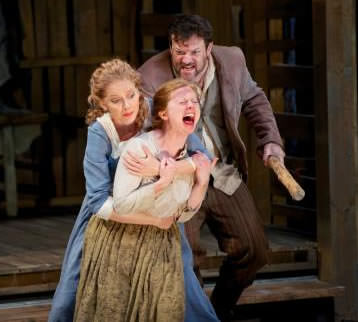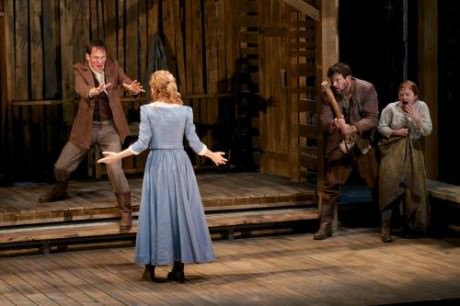Wonders Rattles Skeletons in America’s Closet
A Discourse on the Wonders of the Invisible World, the new play by Liz Duffy Adams, gets its water from the well Nathaniel Hawthorne used to great effect, which is the historical fact that America was created by religious fanatics. We may call this place “The Land of the Free” in popular song, but the Puritans who set this country on its tracks didn’t see it that way: they had no qualms about killing people whose ideas differed from their own. Discourse imagines the later lives of key players in one of the country’s lustier religious killing sprees: the Salem witch trials, which ended 25 lives. One is tempted to call them innocent lives, as Abigail Williams does in this play, but Hawthorne would remind us that lives and people are complicated things; calling them innocent is usually no more precise or more useful than calling them guilty.

The play opens with Mercy Lewis, one of those religious fanatics, pounding the hell out of something with a heavy mallet. She’s on top of a structure that could be a gallows-in-progress — which would be consistent with the noose in the playbill — but turns out to be a tavern. Cassie Beck plays Mercy with the emotional equivalent of blunt-force trauma, which manifests in physical energy that borders on menace much of the time. Every time she shouts at her servant girl, everybody in the theater jumps. Mercy’s pummeling is interrupted by Abigail Williams (Susannah Hoffman), whom she last saw ten years earlier, when they two were the chief accusers of witches in Salem, and the chief witnesses against them. Abigail hopes to exorcise the demons she has carried since that time, and that desire makes Mercy wonder whether Abigail has become a demon herself.
Well, not really. Beck gives Mercy too much depth to actually think such a thing; and the script acknowledges that Mercy is aware of her own ulterior motives: “I was proud to do it,” she says of accusing her neighbors. “I was sent for, all over Essex County. I was the witch finder. I had a name!” After the governor abruptly called an end to the trials, Mercy was disgraced. “I had to marry a good-for-nothing who went and died and left me stranded up here where I’ll never be wanted again,” she admits, and that’s pretty close to admitting she knows she was wrong.
Next to Beck, Susannah Hoffman looks fragile. “We were powerless girls,” she reminds Mercy. “We were orphans and servants. Why did all those great and powerful men listen? Why did they hand their power over to us?” The answer of course is that they didn’t: they used the girls as instruments of a power which the girls were too young to recognize or understand. That’s always the way. In fact, for a while it looks like Mercy is doing the same thing: using lesser people as instruments to satisfy her own ends.
In this case the lesser people would be Jude, a local farmer, and the Reverend Peck, who resort to Mercy’s tavern because they’re bachelors, and they don’t want to spend this particular night in the silence of their own homes. Jude is a thick-neck who carries a cudgel, which is probably the tool he uses to open space for a thought. Peck is more complex, a man who claims to do double or triple duty with his talents, though he’s never really been ordained for Christian ministry. Joey Collins plays him as a slow-but-systematic thinker whose zeal for Puritan doctrine makes him feel more powerful than he actually is — and thus makes him easy to manipulate. Before Mercy can say ‘The devil may care,’ Peck, who is also the local magistrate, has indicted Abigail for witchcraft. Mercy couldn’t be more pleased.
For a while near the end of act one, the play seems ready to put two opposing philosophies into the ring and watch them battle it out. Peck is narrow-minded, but he gets his authority form special study of a sermon by Cotton Mather entitled “A Discourse on the Wonders of the Invisible World.”
“It’s an extraordinary document,” playwright Adams told Casey Hayes. “For Mather, ‘wonders’ are not a good thing, and the invisible world is a real and terrifying place. For me, the title operates on multiple levels, and was a powerful — almost magical — instigator. When I found that title, I knew I could write the play.”
Peck’s opponent in that battle, and thus Mather’s opponent, would have been John Fox, “a man of around 30, more or less, of mixed ethnicity: Native American, African, Spanish, almost anything except Northern European,” the notes specify. He enters Mercy’s tavern in a long black coat and a high black hat right after the servant girl has claimed to see the devil coming, dressed in just that way. While everybody stares in awe and disbelief, Fox unbinds the indicted prisoner and then asks, “So what are we talking about?”
Fox’s comments during Abigail’s trial show that he’s beyond the jurisdiction of Cotton Mather’s view of the world, and Fox seems eager to engage and overthrow that ideology, tenet by tenet. But at the beginning of the second act, the play separates the proponents of those two visions from each other, and they never occupy the same space or wrestle with each other again. That potential for conflict being neutralized, the rest of the action unfolds along the predictable lines of a romance.

Collins and Beck squeeze as much as they can out of their characters, and there’s a passage in act one when Lighting Designer D.M. Wood creates a bewitching montage of moving shadows on the wall behind the servant girl, Rebekkah, making it look like wonders from the invisible world have come to help her tell the story of Macdeath. Perhaps those wonders pushed the confrontation between the Puritan vision that created this country and the pluralist vision that thrives in it today right off the stage. Perhaps the playwright didn’t think that there was any contest in that fight. Hawthorne, who was descended from one of the judges at the Salem witch trials, would beg to differ.
Running time: Two hours, with one intermission.
A Discourse on the Wonders of the Invisible World plays through July 28, 2013 at The Contemporary American Theater Festival in Shepherdstown West Virginia. For tickets, call (304) 876-3473, or purchase them online.
LINKS
Mark Dewey’s review of Heartless.
Mark Dewey’s review of Modern Terrorism: Laugh and Laugh and Tremble.
Mark Dewey’s review of H20.
Mark Dewey’s review of Scott and Hem in the Garden of Allah.
100 Plays Produced as CATF Kicks off Ambitious 23rd Season by Sydney-Chanele Dawkins.




